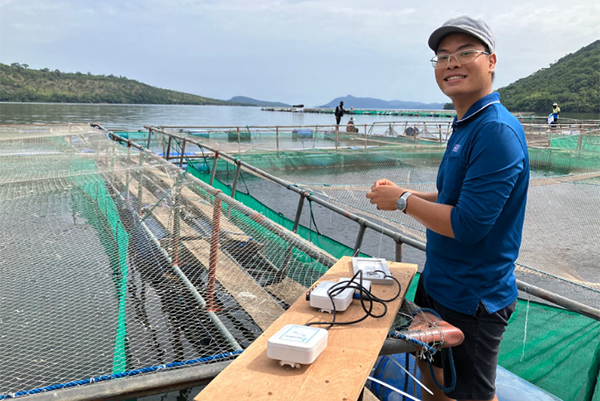
Bioceanor, a French startup specializing in water quality using disruptive technologies (IoT and IA), has launched a program to enhance fish health in tilapia farming. Partnering with Virbac and Tropo Farms Ltd. in Ghana, Africa, the initiative will leverage data analytics and machine learning to correlate and anticipate tilapia health and growth using environmental data.
“It is a great opportunity for Tropo Farms Ltd. to go further in the digitalization of our farms, with recognized experts, in the context of global climate change which will require even more data-driven decisions on our end,” said Francisco Murillo, CEO at Tropo Farms in a LinkedIn post.
Bioceanor has developed a system that can measure over 15 physicochemical parameters, including temperature, salinity, pH, oxygen and turbidity. This comprehensive data allows farmers to monitor water quality in real time and receive timely alerts through a dedicated web interface. Virbac, international experts in fish health, will support the project.
The program will enable Tropo Farms – one of the largest tilapia farms in Africa – to better mitigate risks, improve production efficiency and promote environmental sustainability.
“We see Bioceanor’s expertise as a very complementary service for Virbac and the farmers to make sure that our solutions will take into account environmental conditions, and therefore, ensure best-in-class fish health monitoring and support,” said Adrian Astier, key account manager at Virbac.
Follow the Advocate on Twitter @GSA_Advocate
… please consider supporting GSA’s mission to advance responsible seafood practices through education, advocacy and third-party assurances. The Advocate aims to document the evolution of responsible seafood practices and share the expansive knowledge of our vast network of contributors.
By becoming a Global Seafood Alliance member, you’re ensuring that all of the pre-competitive work we do through member benefits, resources and events can continue. Individual membership costs just $50 a year.
Not a GSA member? Join us.
Responsible Seafood Advocate
[103,114,111,46,100,111,111,102,97,101,115,108,97,98,111,108,103,64,114,111,116,105,100,101]
Health & Welfare
Aquaculture in Ghana has overcome its historic fits and starts and is helping to narrow the gap between domestic seafood production and consumption. Production is based on Nile tilapia.
Responsibility
Natural factors, institutional support and a big appetite for fish have all contributed to the growth of aquaculture in Ghana, where about 80 percent of all farmed fish is tilapia.
Innovation & Investment
A new Aqua Insights Report from Aqua-Spark finds that tilapia aquaculture is key to food security across sub-Saharan Africa.
Innovation & Investment
Inaugural Aqua Insights report encourages investment in Aqua-Spark’s Africa Fund to kickstart a new era of tilapia farming for the region.
The Responsible Seafood Advocate supports the Global Seafood Alliance’s (GSA) mission to advance responsible seafood practices through education, advocacy and third-party assurances.
Learn More
Javascript is currently disabled in your web browser. For a better experience on this and other websites, we recommend that you enable Javascript.